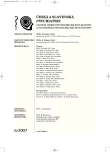-
Medical journals
- Career
Night Eating Syndrome
Authors: F. Faltus
Authors‘ workplace: Psychiatrická klinika 1. LF UK a VFN, Praha přednosta prof. MUDr. J. Raboch, DrSc.
Published in: Čes. a slov. Psychiat., 103, 2007, No. 6, pp. 291-296.
Category: Comprehensive Reports
Overview
There are at least two problems, that involved disordered eating at night. Night Eating Syndrome (NES) and Nocturnal sleep – related eating disorder (NSRED). Night eating syndrome is considered as a dissomnia. It is really an eating disorder; people eat when they are conscious. NES is characterized by the clinical features of morning anorexia, evening hyperphagia, awaking followed by nocturnal food ingestions.
NSRED is classified in the International Classification of sleep Disorders as a parasomnia. It is thought to be a sleep disorder, not an eating disorder. During episodes of NSRED people are not conscious. They have no memories to having done when they wake or they have only fragmentary memories. In some cases, have histories of alcoholism, drug abuse and other sleep disturbances.
Nearly all sleep eaters show a preference for food high in carbohydrates and fat. One to two percent of the general populations are affected with these. NES and NSRED are more common than this generally recognize. Increase stress and fluctuations in hormone levels may be ethiological factor. Changes in the circadian rhythm by an attenuation in the nocturnal decrease of the plasma concentration of melatonin and leptin and an increase of cortisol have been described.
Treatment of nocturnal eating behavior begins with a clinical interview and a night or two at a sleep disorders centre where brain activity is monitored. NSRED does tend do respond well to treatment with medications. Sleeping pills should be avoided. Exercise and relaxation training help NES sufferers overcome insomnia and restore natural sleep cycle.Key words:
Night Eating Syndrome, Night Sleep Related Eating Disorder, neurotransmitters, hormone.
Labels
Addictology Paediatric psychiatry Psychiatry
Article was published inCzech and Slovak Psychiatry

2007 Issue 6-
All articles in this issue
- A Psychosocial Need Inquiry in Young Acute Psychotic Patients (A Pilot Study)
- Pharmacotherapy of Anorexia Nervosa
- Repetitive Transcranial Magnetic Stimulation (rTMS), Depressive Disorder and Cognitive Functions (A Review)
- Night Eating Syndrome
- Central Pontine Myelinolysis in Female Patient with Anorexia Nervosa
- Czech and Slovak Psychiatry
- Journal archive
- Current issue
- Online only
- About the journal
Most read in this issue- Central Pontine Myelinolysis in Female Patient with Anorexia Nervosa
- Repetitive Transcranial Magnetic Stimulation (rTMS), Depressive Disorder and Cognitive Functions (A Review)
- Night Eating Syndrome
- Pharmacotherapy of Anorexia Nervosa
Login#ADS_BOTTOM_SCRIPTS#Forgotten passwordEnter the email address that you registered with. We will send you instructions on how to set a new password.
- Career

